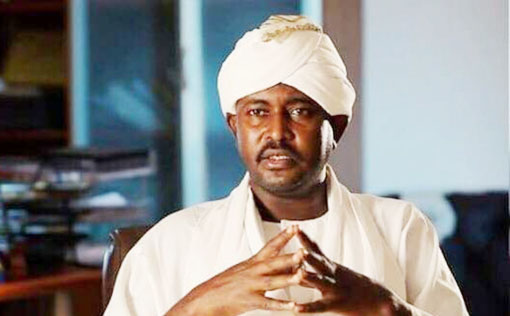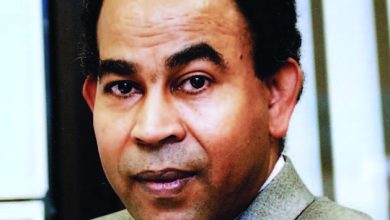About Sudan of a Year of War

Al-Sadiq Al-Rezaiqi
Women and children wait outside Doctors without borders (MSF) clinic in Zamzam camp, where a malnutrition crisis kills one child every two hours. Sudan, January 30, 2024. Source: Doctors Without Borders msf.org
If the war did not end as many expected in the first days of the outbreak of the most violent and brutal African wars, Sudan appears more miserable after a year of war. All that remains of it are the ruins of a homeland, the smell of blood and gunpowder, and the ruins of a society that has been scattered like a spread mattress, and the country is on the brink of abyss, while… The guns are not expected to fall silent anytime soon.
According to official governmental, UN and international statistics, the number of victims of the war exceeded 17 thousand civilian deaths, and more than 12 million people were displaced as a result, from the states of Khartoum, Gezira and the five states of Darfur, and from parts of the states of North Kordofan, West and South Kordofan, and the White Nile, while others fled; nearly 1.9 million Sudanese to Egypt, South Sudan, Chad, Ethiopia, Eritrea, Uganda, Libya, Kenya, and the Arab Gulf states.
The industrial sector also collapsed completely throughout the country, and 9,000 factories were destroyed and stopped in Khartoum and Gezira states alone.
This war, which began 365 days ago, was clear to the eyes before it sparked, and here we are today facing the crumbs of a state whose institutions have collapsed, its citizens have been displaced, its tranquility lost, the integrity of its soil destroyed, it has been penetrated to the core, and it has been invaded by mercenaries of every stripe, creed, bee and colour, in addition to its human losses (killed, injured, assaulted, and displaced). More than 17,000 of its government and service buildings were demolished, and more than 85% of citizens’ homes were destroyed or looted in the capital, Gezira State, and the Darfur states, as well as more than 120 banks in those states.
Observers say: If the fighting stops, Sudan needs a miracle to restore its vital facilities and basic services, such as electricity, water, health, education, roads, and airports, within two years of intensive work. The widespread destruction affected 75% of hospitals and medical services, costing $15 billion. As the Minister of Health recently stated, the energy sector lost approximately $12 billion, and infrastructure losses in 8 months of war amounted to about $60 billion, according to estimates by the Minister of Finance. The losses of the public and higher education sectors are being counted, whose institutions have completely stopped working. Universities were looted, many schools in safe states were turned into centers to shelter the displaced, and about 65% of Khartoum’s schools were destroyed.
The agricultural, livestock, and mining sectors were not spared from this, as the cessation of production led to a decline in the gross national product from 34 billion dollars before the war to a few billion a year after its outbreak, and the IMF expected that the decline in the gross national product for the year 2024 would exceed a rate of 18.3%, with mining revenues and gold exports declined, and oil production stopped (less than twenty thousand barrels per day).
The industrial sector also collapsed completely across the country, and 9,000 factories were destroyed and stopped in Khartoum and Gezira states alone. The industry’s contribution to the GDP was 21%, while the agricultural sector contributed 32.7%, the International Monetary Fund says; The Sudanese economy is facing a catastrophic contraction of more than 12% after the destruction of human capital and state capabilities, the cessation of production, and the collapse of the commercial and financial service sectors, and information and communications technology. Previously, the service sector contributed more than 40% to the gross domestic product (GDP).
At the level of the state and its institutions, the performance of government offices, institutions and agencies has stopped slightly, and there is now no actual government that fully exercises its powers and authorities, and five states have fallen out of state control, namely; West, Central, South and East Darfur, and Gezira State. Public service in the country was cut off. The ministries in the federal government no longer communicate with other states, and the state’s functional work pattern does not flow in many parts of Sudan due to the absence of the public service apparatus, the police, the judiciary, the public prosecution, the departments of education, health, customs, taxes, and others.
All Sudanese airports also stopped working, and Sudanese airspace was closed, and only the airports of Port Sudan, Kassala, Meroe, Dongola, Damazin, and Kadugli were operating, while the Sudanese faced the specter of isolation from the world. The rebels attacked the engineering sites of telecommunications companies, and Internet and communication services stopped for nearly two months in many states, while the transportation sector lost all its capabilities, and transportation movement stopped by 90% throughout the country.
These indicators of the extent of the devastation caused by the war in its last year are accompanied by the effects of the war on society, which are the worst and most devastating consequences. For the first time in the history of Sudan, calls for tribal and regional alignment are openly raised, the flames of tribal fanaticism are rising, and the taint of hate speech prevails in a chilling way, the face of Sudan and its bright image of social cohesion are stained by unprecedented racist delusion.
The Sudanese did not dare to denounce the lower states and criticize tribes and ethnic affiliations as they do now, and the reason is the reckless racist rhetoric adopted by the RSF Militia to justify its rebellion against the state, and it turned to regional and tribal mobilization from inside and outside Sudan, exploiting the regional contexts – from both the social and political aspects – Which made tribes in Chad, Niger, Mali, southern Libya, Central Africa, and South Sudan join forces and export their mercenaries in a regional war against the Sudanese State.
The feeling of the Sudanese was not devoid of the firm belief that the process of seeking help from the tribes, recruiting their sons within the RSF, attracting tribal leaders and some politicians from the social circles, and the dependence of the RSF on tribal loyalty, is nothing but an explicit call to destroy the state, practice genocide, and create a civil war. And the blind instigation of ethnic cleansing that has already been practiced in some states. There is no sane and conscious person who does not understand that the rhetoric of RSF and its horrific practices hastened other racist calls to surface, take the lead on the public political and social scene, and place the country in the context of civil war.
To further tear apart Sudanese society, RSF, and behind it regional states in the Arabian Gulf, Israel, and neighboring Sudan, played a major role in fueling tribal sentiment and fanning its burning fires among the 160,000 fighters that RSF mobilized to fight in Khartoum and other states of Sudan, the tribes represent Arabs: (The Rizeigat, which is the tribe of Hemedti and his family, the Misseriya tribe, the Hawazma tribe, the Beni Halba tribe, the Salamat tribe, the Mahdi tribe, the Ta’isha tribe – the Fallata tribe, the Tha’alba tribe, the Tarjem tribe, the Ziyadiya tribe, the Habaniya tribe, the Saada tribe, the Awlad Rashid tribe) the main source of the forces, and they are the tribes most targeted by the RSF by recruiting their sons, and enticing and intimidating their leadership and leaders to stand with them. The sons of these tribes represent 65% of the fighting forces in the ranks of the RSF during the war period in the first months, then the number increased from May 2023 until Today, with the entry of mercenaries from tribal extensions into neighboring countries of Chad, Niger, Mali, Nigeria, Central Africa, Libya, South Sudan, Mauritania, Burkina Faso, Ethiopia, Eritrea, and Yemen.
Because of this tribal support, and the control of the Dagalo family (who are descended from a specific family and sub-clan of the Rizeigat tribe), over the leadership positions in the RSF, other non-Arab tribes became apprehensive about the RSF plan to control Darfur, and these tribes began to feel targeted, as happened in West Darfur state for the Masalit tribe when the door opened wide for civil war in the states of Darfur, which have been living in fragile situations since the year 2003, when the first rebellion appeared in Darfur through movements that belonged to non-Arab tribes, and now these tribes in Darfur in particular (Masalit, Fur , Zaghawa, Medob, Berti, Dajo, Tanjur, Aranga, Mima, Tama, Barqu, Barqad, and others) that they face an inevitable fate if things fell in the hands of RSF.
The same apprehension was held by other tribes in the Kordofan regions, especially in Delling, when the “RSF” attacked the Nuba tribes in South Kordofan, and continued to attack them throughout the past months. The same thing is being experienced by Arab tribes in Gezira State, which they classified by “RSF,” a political classification that the residents of the state are remnants of the former regime or citizens of what the black propaganda chorus by “RSF” spokesmen on social media calls them the embodiment of the 56 state, which is a miserable, backward, dysfunctional term, unconsciously borrowed by the RSF rebellion from other Sudanese rebel movements that have ended for years, the rambling speech became forgotten.
What is important in this discourse is: The war in Sudan has produced a tragic situation on the humanitarian level that cannot be tolerated, including displacement, severe food shortages, and the specter of famine looming over the country. It has also produced countless human rights violations, in which attacks on women have reached an extent that no other wars in the region have reached. In this war, Sudanese society is witnessing a horizontal and vertical division, the repercussions of which cannot be imagined in the present or in the future, and which will cast dark shadows on the country’s unity and cohesion.
While the Sudanese hope for the war to stop and for them to return to their country and their normal lives, fears appear before them, especially what is happening behind the scenes in the region, the neighborhood, and some international powers to prolong the war, and the lack of a regional and international desire to generate appropriate solutions until the war ends. Negative interventions and external support for the rebellion, supplying it with military equipment and weapons, harnessing supportive media outlets for it, and adopting a political and public relations campaign in its favor will make this war rage unabated. There are those who throw firewood and adds fuel to its fire every day.
Last update: 16/4/2024



